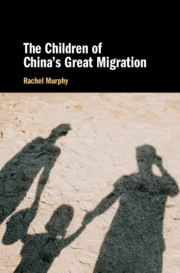Book contents
- The Children of China’s Great Migration
- The Children of China’s Great Migration
- Copyright page
- Contents
- Figures and Maps
- Tables
- Acknowledgements
- 1 Understanding the Lives of Left-Behind Children in Rural China
- 2 Migration, Education and Family Striving in Four Counties of Anhui and Jiangxi
- 3 Sacrifice and Study
- 4 Boys’ and Girls’ Experiences of Distribution in Striving Families
- 5 Children in ‘Mother At-Home, Father Out’ Families
- 6 Children of Lone-Migrant Mothers and At-Home Fathers
- 7 Children in Skipped Generation Families
- 8 Left-Behind Children in Striving Teams
- Appendix: Field Research on Left-Behind Children in China
- Bibliography
- Index
3 - Sacrifice and Study
Published online by Cambridge University Press: 06 August 2020
- The Children of China’s Great Migration
- The Children of China’s Great Migration
- Copyright page
- Contents
- Figures and Maps
- Tables
- Acknowledgements
- 1 Understanding the Lives of Left-Behind Children in Rural China
- 2 Migration, Education and Family Striving in Four Counties of Anhui and Jiangxi
- 3 Sacrifice and Study
- 4 Boys’ and Girls’ Experiences of Distribution in Striving Families
- 5 Children in ‘Mother At-Home, Father Out’ Families
- 6 Children of Lone-Migrant Mothers and At-Home Fathers
- 7 Children in Skipped Generation Families
- 8 Left-Behind Children in Striving Teams
- Appendix: Field Research on Left-Behind Children in China
- Bibliography
- Index
Summary
Chapter 3 explores how study and educational aspirations underpinned families’ migration projects. In daily life, the children were subjected to family members’ and school’s efforts to encourage them to accept the logic of parent-child striving teams. Study provided the children with a stake in their family’s migration project, a way for them to honour their parents’ sacrifice, a way for them to win their migrant parents’ recognition, a distraction from missing their parents, and a route to securing a better future than the lowly lives endured by their migrant worker parents. Children of primary school age were the most able to accept that their migrant parents’ sacrifice would be worthwhile if they studied hard, because at this stage their academic promise had yet to manifest itself. By contrast, some teenagers’ feelings about the work-study team’s promises generated inner conflict as it became apparent that they were unlikely to pass milestone exams. Some teenagers felt that they were ‘useless’ because of their low grades. Crucially, though, a few teenagers who had access to viable vocational training options felt more positive about their left behind pasts and about their futures than did low academic performers without such options.
- Type
- Chapter
- Information
- The Children of China's Great Migration , pp. 66 - 94Publisher: Cambridge University PressPrint publication year: 2020

